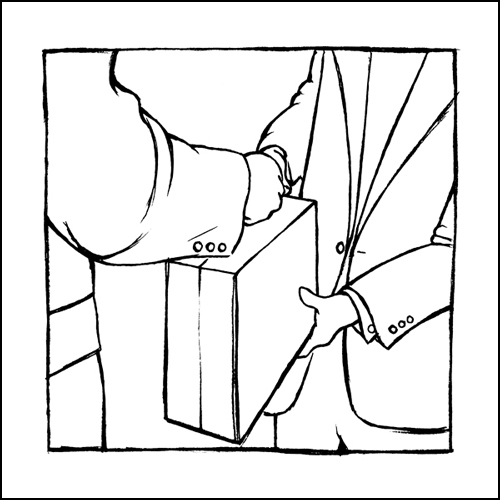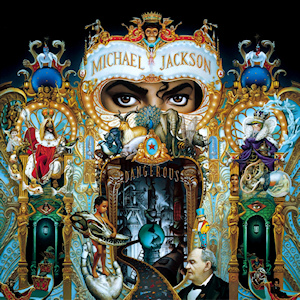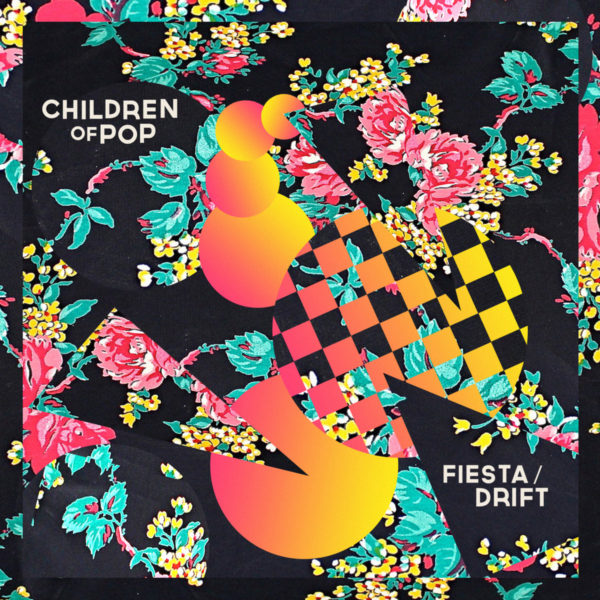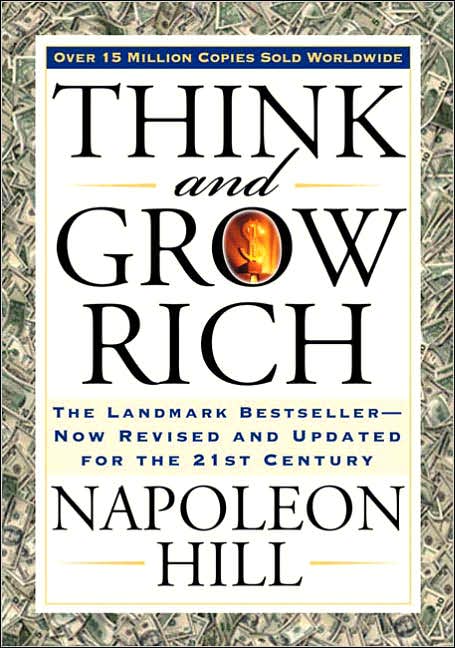interview by Michael McCarthy
If you’re a fan of delicious indie pop then you should definitely read the following interview with Chase DeMaster, who sometimes goes by children of pop (he doesn’t capitalize it), such as on his new album: children of pop: What Does 69 Mean? It’s one hell of a catchy record, throwing earworms at you left and right, like they’re firing from a confetti gun, but it’s certainly not aimed at cheesy top 40 radio. If anything, Chase went out of his way to ensure that it would not be mainstream, bubblegum fodder. (Instead of losing its flavor, it gets tastier with every chew.) The term “art pop” immediately comes to mind while listening to the vibrant “Manic,” the album’s decidedly quirky opening number, which throws quite a few surprises at the listener as it goes on. Other tracks are slighty less off the cuff, such as “Suits Your Lies” (my personal favorite) and “DREAMCAST SWIRL EMOJI.” Throughout the 10 track album, there’s an exciting electricity that surges through the layers and layers of synth, drum machine beats, and nuanced vocals that are the album’s staples. Listening to it is like looking through a kaleidoscope and constantly being wowed by what you see and I’d like to think the following interview gives off similar vibes. Read it and see for yourself. More importantly, check out the songs posted below and check out the album, which was released on May 6th via Frenchkiss / The Orchard imprint #veryjazzed.
MM: I saw on your press release that you’ve recently played several dates in Texas. Is that where you’re from?
CD: Yeah, I live in Houston.
MM: Were you born in Texas?
CD: Yeah, born in Houston, Texas.
MM: Could you ever see yourself moving to New York or L.A. to better your chances with music?
CD: Yeah, I mean, I think about that all the time. It’s really like an X&Y ratio though, you know? You gotta pay bills – living expenses are so much higher. How much are you willing to let go so you don’t create as much? Because, to me, it’s like, you know, obviously having a music career is really dreamy, but I’m kind of like living the dream right now, getting to make music every day. Why would I change that to go work a job so that I can make other people think my music is good? You know what I mean?
MM: Yeah, definitely.
CD: So you get the X&Y ratio. It’s like, I’m kind of already getting to make all of the music I want. Maybe I would be able to work with different people, there’s that. Maybe the career would be better and I could make higher quality music at a different level with better mics or better computers or something. I don’t know. You know, I have a couple friends in Los Angeles and New York and their careers are much more along than mine and the time they have to exhaust, just the maintenance of living, is so much greater than what it is in Houston. I’ve been a professional musician full-time for ten years now. It’s fun, dude. It’s fun. You know, like, what’s a plane ticket? If I’m gonna go to Los Angeles or I’m gonna go to New York. It’s like a couple hundred bucks. So, yeah, I think about it. I do. In the end, I do want to be in Los Angeles or New York. But right now? I’ve got so much more music that I’m inspired to make and I don’t want to have to go work something or do something else and put that on the back burner.
MM: How old were you when you wrote your first song?
CD: I don’t know. Maybe about 16, I think I wrote a song. I was trying to kiss my girlfriend so I wrote a song and then I recorded it and then I brought the tape player and played it for her at the picnic that I made.
MM: Did it work?
CD: It worked.
MM: Sweet.
CD: Yeah. Now she’s my wife.
MM: Oh, really? Cool.
CD: Turn the 6 upside down. She’s a wife now. [Laughs]
MM: Did you write any less experimental songs before you got into the experimental electronic music?
CD: Yeah, I mean, I never really thought of it like that. I never thought of my music as being experimental. But it’s cool that you have an idea about it, you know? I write a bunch. I just wake up and I let the wave take me. Wherever the ideas go, I let them unfold. The first idea, the best idea. Have you ever heard that thing?
MM: Yeah.
CD: First idea, best idea. I work off that. Sometimes. And then sometimes I’ll really change things over and over and over and over. I started playing music on a guitar. And then I was attracted to the sound world that you could build with a computer, you know? Then I started gravitating towards that. There’s just so many more tones, timbres, textures, you can build.
MM: What programs do you use for producing your music?
CD: I use a lot of keyboards and drum machines and things like that. Synthesizers. And I use Logic 9 for tracking a lot of my ideas and I just got started on working on Abelton about two years ago. And, actually, when I was working on this record I told myself I was gonna do it on Abelton, but I never did. I just did the whole thing on Logic.
MM: I used to do stuff on Acid years ago but I haven’t done any in a while.
CD: Cool. I’m not familiar with that one.
MM: It’s similar to Pro-Tools, I guess. Is Logic really expensive?
CD: You know, it’s not. It’s only two hundred dollars. For the brand new one. I have the old one.
MM: What was the first album you ever bought with your own money?
CD: Michael Jackson, Dangerous. Yeah. I think I was about five years old or something.
MM: Do you still like it?
CD: Love it.
MM: What’s the last album that you bought?
CD: I just ordered – it came in last night – this tape of Indian dances. I have yet to listen to it. I got it off ebay. Previous to that, my friends TV Girl, their new album Who Really Cares? Which is really good. I care a lot. [Laughs] It’s so good.
MM: How would you describe their sound?
CD: I would say it’s like this quasi-’90’s nostalgia but it’s the doo wop ’50’s, ’60’s nostalgia through the ’90’s lens. In a modern internet sarcasm. It’s very American sounding. And it’s also extremely like California. Have you ever been to California?
MM: Yeah. I lived in L.A for three years.
CD: OK, well, you’ll listen to it and it’ll take you there, man. It’ll take you right there in the sun. And the apathy and, awe, it’s just so good. It’s Brad, Jason and Wyatt. Dudes, but they go by TV Girl.
MM: Your previous album Fiesta/Drift was done as a duo with Gabriel Lopez. What did each of you contribute to the project?
CD: So, it was just me and Gabe, he is like the engineer behind the live performance. We have everything stemmed and he does like live remixes of the music. And then I’ll just sing. We used to be like electronic drums, keyboards, basses, synthesizers, guitars, and there was this huge ensemble thing, but it just was so expensive to travel and it didn’t really add up. So, I started working off of the computer live as well. And Gabriel runs the computer live.
MM: Did you already have a record deal when you made that album?
CD: I did have a record deal. And those were all supposed to be demos, but then the record label and my manager, who were one in the same, he said, “I don’t like it anymore. I don’t want to work on this.” And I was like, “Dude, that’s not why we signed a contract.” So, like a year and a half of demos and then about six months of sulking and then I released it. I made my own record label and released it digitally and I reached out to a record label called Chill Mega Chill and they released it on the tape. And they’re releasing the vinyl with me as well. For this new one, too.
MM: Are you a big fan of vinyl?
CD: I do like vinyl. I like all kinds of music. Especially the Frisbee shaped ones. Yeah, you know, I like the sound of the cars driving by right now.
MM: Do you play all of the keyboards on What Does 69 Mean?
CD: I do.
MM: How long have you been playing keyboards?
CD: You know, I always wanted to play keyboards but it was probably two thousand and – well, it sounds like I’m gonna say something that’s not too long ago because it feels like that, but ten years. 2005, 2004. End of 2004, I’d say. I started with the piano whenever I went to music school.
MM: So, you had lessons?
CD: I did. I had lessons and I was the worst student.
MM: Really? How come?
CD: I just wasn’t, you know, I just didn’t practice. The classic story. I didn’t practice guitar either. But, I don’t know, somehow I just kept getting better.
MM: Do you do a lot of samples and loops in your music?
CD: I try to do like all of my own samples, if that makes sense.
MM: Yeah, like make your own?
CD: Yeah. Whether that means like playing something and then turn it into a sample or I’m halfway through the song and then I grab the vocal and turn it into a musical sliver or flash or something. But sometimes, you know, sometimes I’ll sample things. But I’ll change them so much that it’s not like a nostalgia based sample. You can’t go backwards with it anymore.
MM: So, you change it so much that people wouldn’t recognize it and sue you?
CD: Yeah. Because I don’t want to go down that road where I get in trouble. I don’t have that Kanye money, dude. I just can’t.
MM: You joke that your album contains songs that you wrote for Drake and a bunch of others, like Beyonce and Madonna. If you were gonna write a song for one of them, who would it be?
CD: That’s a good question. I guess if I had to choose one it would be Drake. I don’t write music that he would sing, but… Or Majid Jordan. I’d love to make music with him. They’re two people Majid something and something Jordan. They’re on Drake’s record label and they often times sing with Drake. And produce with Drake. But, yeah, I just like Drake. I mean, Madonna would be cool, but she’s too – Nah, I take it all back. Beyonce. You know, I did joke about it, but as soon as I found out that Drake had a ghost writer that’s when I wrote the song “Manic” because I was hoping that I could give it to him. And he could hook it up. Then like some of the music I was writing specifically for Beyonce to sing.
MM: Which one was for Beyonce?
CD: I was really going for Beyonce on “Dreamcast Swirl Emoji.” I was listening to Four a lot and that song “Countdown,” it’s so good.
MM: Did you know her new album has 55 writers?
CD: I do not doubt it. Because it is really good. [Laughs] I mean, just the production of even the video work. You know, and it’s funny because everybody says – I don’t know what you feel about all this stuff – but it is a nice conversation to have – people talk about the thing where it’s like oh, she took too many writers, it’s not as good. Or something like that. But let’s talk about the video. I don’t even doubt that it took less people to do the video work with that hour long music video. And nobody’s getting credited or discredited at all but we’re all getting to consume that art in it. That’s just as powerful. The whole thing together is even more powerful than anything Drake is doing.
MM: Have you heard Drake’s new album yet?
CD: Oh yeah. We listened to it immediately. My wife and I. We put it on right away.
MM: Cool. What did you think of that one?
CD: Well, this one’s a little bit tough, you know? I am so, like, I just see so much value in Drake’s voice – not his literal voice, but his artistic voice – and I’m so familiar with it, I feel that the album – I already felt like I knew it before I even knew it. And it wasn’t even that. He was doing like a softer voice and I was kind of like, what the heck, man? And he’s trying to be like edgy and stuff, but it’s just like, I don’t know, it’s just fucked.
MM: I thought it was too much like stuff he’s done in the past. Not really forward-thinking.
CD: Right! And you know for him, he’s conceptualized it in a way that he’s doing something different, I feel like, but like it just sucks because I feel like he’s polarized everyone. I feel like the mass public, they love it, right? And then the conscious music listener or critique or artist or critic or you know, I feel like everyone in this community has been like, what the heck, man? [Laughs] I’m still gonna listen to it. I’m gonna grow with it and I’m gonna see if it resonates with me in different ways but so far it’s just more of the same.
MM: “Don’t Change For Love” features Wrestlers. Did Aidan and David both contribute to the track?
CD: Just Aidan. He came over one day and he brought his Novation Bass Station. So, it was just like a piano thing, right? And I just added a little twirly high hat and bass drum, but I wanted to maybe get some more rare bass tones than I was getting currently and I had just kind of rehearsed with him, but we were talking about doing some vocal stuff live with their group – with me singing it – but I witnessed his bass station and I just found it awesome. So, I asked him to come over and we could try to get some sounds off of it and it worked.
MM: So, he played it on the song?
CD: Yeah, he played it. I played a little bit of it. We were just kind of jamming through it.
MM: You have two collaborative albums coming out. Get A Life with Yuuki Matthews and Guess Genes with Sergio Trevino. How did those collaborations come to be?
CD: Well, Sergio lives here in Houston and he plays music mostly with a band called Buxton. They’re like an indie folk band. They’re signed to New West records. They just put out a new album probably last year called Half A Native. So, I did the first children of pop record and Sergio liked it and I’ve always been a fan of his and looked up to him. He’s from the Houston music community. He liked the children of pop album and he said whenever we both get some time, let’s work on a project together. So, yeah, we did it.
MM: What did each of you contribute to the album?
CD: How that would work is Sergio would come over and he’d say, OK, I wrote this song yesterday. And I’d be, cool, let’s track a demo of it so we can listen to it. Then he would sing and play it on his guitar and I’d record it and nine times out of ten that turned out to be the master. That turned out to be the actual vocal part and I would try to hide the guitar and I would arrange the sound world around that. So, yeah, it was really cool. Our main launching point for that record was Peter Gabriel’s – I’m forgetting the name of the song – “Don’t Stop,” I think.
MM: I’m not sure, off the top of my head. [Editor’s note: I couldn’t find any Peter Gabriel song with that title, but I think he was referring to “Don’t Give Up” featuring Kate Bush.]
CD: All I can think for song titles right now is [my] “Don’t Change For Love” song. So, yeah, we had this really kind of specific sound world that we were shooting for and then we just went for it. I would just throw sounds out and he would filter it.
MM: Did both of you do vocals on the album?
CD: This is mostly Sergio’s vocals. Like 99%. I think I sang on the mic like one time.
MM: Is the music as electronic sounding as children of pop?
CD: There’s definitely an electronic sound. It’s not as dance music driven. It’s more about the song. And it’s also, like, we used the voice of a Juno-60 a lot on that album. So, it sounds very ’80’s. The timbers of the tones.
MM: And what about the Get A Life album with Yuuki? How did that one come about?
CD: One day children of pop played with the band Hundred Waters. They had a Superbowl commercial for Coca Cola like last year or something. Anyway, we played with them and they brought all this gear and at the time children of pop was like a live band and I was trying to move into utilizing a computer and just bringing computers in. And they brought about five computers for each person on stage as well as like a $40,000 mixing console, two lighting installments, [and] another mixing engineer. And it really bummed me out because I felt like I couldn’t compete with that production level. Financially. So, the next day I woke up and I was just so over electronic music and I made this guitar song called “Get A Job.” I thought that was the only way I’d be able to make it in the music world like that was if I got a really crazy job that gave me a lot of money then I could just buy my way in. So, I wrote that song “Get A Job” and then I called the band Get A Life and then I just kept on writing in that style. And it was like a one take Timmy. Write the lyrics, improvise the music and sing to it. Don’t edit it. Don’t mix it. Don’t really do anything to it. If I messed up on the bass track then I kept it. If I played the wrong chord on the guitar I kept it. If the vocals were bad, I turned them up. So, I had that and I kept writing on that and I had about six songs maybe and I went to go listen to Dave Bazan at my friend’s house and he brought Yuuki Matthews with him and they were performing a ten year anniversary concert of the album that David had released previously called Headphones. So, they had two keyboards. Yuuki was playing bass and some key melodies. David was playing the drums on the keyboard as well as some chord progressions and David was singing. It was so cool. Anyway, I met Yuuki after the show and I introduced myself and asked if I could send him some music and he said yeah. So, I sent him all the music I’d ever made and he really liked the Get A Life music. So, we started working on it together. And that system goes like, I’ll write a song and record it very poorly and I’ll send it to him and he’ll make it sound good. So, he’s kind of like the engineer, mixing producer and I’m working as the songwriter, producer, engineer. It’s fun. I like working with him. He’s very talented. He’s older than me, you know? So, he’s more experienced. He’s got a better ear. He’s got better gear. He knows how to do things more quickly than I do.
MM: When will Get A Life and Guess Genes be released?
CD: Good question. So, we’re searching for artwork for Guess Genes right now because it’s done. We’re just looking for the art. And that’ll be probably three or four months from now, I could imagine. And then the Get A Life is probably gonna be December.
MM: Are you looking for a record deal for those?
CD: Well, always looking for a record deal. But I’ll probably – you know, as a back up plan – release them through my record label Very Jazz.
MM: Cool. Now, at the end of our interviews we always ask some random questions. Is that cool?
CD: It is.
MM: What song is stuck in your head right now?
CD: Man, I can hear a lot of songs if I choose. My knee jerk, immediate reaction is Drake “9.”
MM: Who’s the coolest musician you’ve ever met?
CD: Probably George Quantan.
MM: If you could have any person come to one of your shows and watch you perform, who would you pick?
CD: Well, I think it would be cool to hang out with Elliot Smith. But as soon as I thought that I thought, man, he’d be such a bummer to hang out with. I don’t know. I listen to music for different reasons and I want people to listen to me. That’s tough. I’m gonna stick with Elliot just ’cause maybe he’s got some different kind of ideas whenever you hang out with him in real life.
MM: You’re talking about the Elliot Smith who died, right?
CD: Mmm-Hmm.
MM: What’s the most awkward exchange you’ve ever had with a fellow musician?
CD: Money. [Laughs]
MM: Are you a big fan of texting or do you find it annoying or…?
CD: I could text all day. Sometimes I text all day. Sometimes I text all day and all night.
MM: Name five of your favorite books, albums, movies or tv shows?
CD: Favorite book: Think and Grow Rich by Napoleon Hill. Favorite movie: Fugazi Instrument, the documentary from Fugazi, the band. And then a TV show? I’m gonna say my favorite tv show is NBA on TNT with Shaquille O’Neal, Kenny Smith, and Charles Barkley.
MM: So, are you a big sports fan?
CD: I love basketball. That’s not a sport. That’s better than a sport. All the other sports are kind of lame. [Laughs] Football is trash. Running their heads into each other, getting concussions. Have you seen that movie?
MM: No, I haven’t, but I’ve heard about it.
CD: It’s terrible, man, all of these football players – not all of them, but some of them – get out of the NFL and within years they’re already sueing the NFL.
MM: Yeah. They get a lot of brain damage. It’s sad.
CD: Dude, so sad. And I feel guilty every time I see somebody on TV playing football. My wife and I have been boycotting football ever since we saw that. We’re not gonna participate in it. If we go to someone’s house and they have the football game on we break their TV.
MM: Really?
CD: Not really, not really. [Both laugh] We just don’t watch it. We just don’t do that. We don’t go to the Superbowl parties. No, that’s not OK.

MM: So, what are some of your favorite music albums and movies?
CD: Let’s see. Music. That’s a hard one, you know? I love all kinds of sounds. I’ve been listening to Winners Never Quit sometimes at night, by Pedro The Lion. I’ve also been listening to Abhi/Dijon.
MM: What kind of music is that?
CD: That’s like R&B. I’ve been listening to Josiah Gabriel a lot. And then an artist from Los Angeles called Pastel. It’s like R&B pop. Soul music. They’re really minimal. Incredible vocals.
MM: What about movies?
CD: I love them.
MM: What are some of your favorites?
CD: Well, let’s see. I really like that Arthur Russell documentary. A Portrait of Arthur Russell. There’s another one called Feel The Sound. I really like that one.
MM: Have you see The Rise and Fall of Tower Records?
CD: No.
MM: That’s a really good one. Because it’s not just about Tower Records. It’s about how culture has changed. It’s pretty fascinating and sad.
CD: Right. Especially where now we live in a paradigm where everyone makes music and eventually they’ll be on the internet. Everyone will be posting their music the way everyone is posting their pictures. And that is crazy sad.
MM: What’s the most useful piece of advice you’ve ever been given?
CD: Anything that the mind can conceive and believe, the mind can achieve. I like that one.
MM: Who is your favorite Star Wars character?
CD: I gotta go with Luke. I mean, he’s missing his hand right now. He’s on that mountain. But he’s being patient. I want to go with Luke but there’s also a choose your own adventure answer on this one. For a limited time, at the very beginning of this current movie they’ve got the blood on this Stormtrooper’s mask. For that sliver of time he was my favorite character. Just because the idea of the Stormtrooper is that he is identity-less. He is void of having an identity. In this one instant whenever he has the blood on his mask and then he delineated from the herd, then he has an identity. In that one moment.
MM: It’s something that makes him different.
CD: Yeah.
MM: Last question. If you had a million dollars to give to charity, which charity or cause would you give it to? It can only go to one.
CD: Probably Make a Wish or Big Brother Big Sister. I know that you just said one but [Laughs]. I can’t choose. I have decision anxiety. Especially with money, you know? It’s just so tough.
Special thanks to Chase for taking the time to chat and to Scott at Tell All Your Friends PR for setting it up.
Buy What Does 69 Mean? on Bandcamp.
LINKS
Facebook
Twitter
Soundcloud
Instagram







Leave a Reply to generica Cancel reply